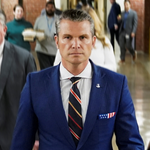
Kara Swisher and Steve Case go back — way back to the 1990s. She was a young Washington Post reporter covering a new thing called “the internet” … and he was a co-founder of the company that became AOL. In the latest episode of On With Kara Swisher, they take a walk through time to look at how far the world has come and where tech companies have stumbled or fallen flat.
They also discuss Case’s new book, The Rise of the Rest, which offers an optimistic future for the expansion of entrepreneurship and innovation beyond a handful of places like Silicon Valley. And they contemplate whether the distribution of economic growth can happen given some of the nation’s political divides — and whether it can even help bridge those divides.

On With Kara Swisher
Subscribe on:
Kara Swisher: You told the Times — the New York Times — that you hope we can avoid a quote “entrepreneurial culture war.” What is this, and how do we avoid that war? Because, since Dobbs, there’s gotta be people worried about locating in companies or giving money to those states or having employees there.
Steve Case: Yeah, I think it’s something to keep an eye on. I think we’re in the middle of this kind of “re-sort” for the last couple years. People talked about the Great Resignation with people leaving jobs because of the pandemic. I think we’re now starting this kind of Great Re-sort where people are deciding where they wanna live and how they wanna work and sort of this — not just hybrid work and remote work — it’s sort of a broader rethink.
So there are a lot of people that are trying to think, Well, maybe I don’t have to be in Silicon Valley. Maybe I don’t have to be in New York City. Maybe I can be someplace else and are starting to think about where they should be. Some will just make it a decision based on family reasons or lifestyle reasons. They like the hiking; they like the skiing. Or cost-of-living reasons, — you know, easier and cheaper to buy a house — or even tax reasons.
But I do think some number of people — maybe a lot of people — will factor in some of these social issues, including exactly what you said: policies different states are putting in place around abortion and other kinds of issues. So I hope that states that are making these decisions recognize there could be some unintended consequence, and it could impact their ability to win the battle for talent.
K.S.: But does it hinder it? Because every state you talked about is about to put in almost total abortion bans.
S.C.: No, it’s not every state we’ve talked about, but I think there will be an impact in terms of some people deciding not to move there that otherwise might have moved there.
K.S.: Do you go to those states and say, “This is not gonna be good for your state particularly” or not? Or just let them do what they want to do?
S.C.: No, we have conversations with policy-makers in most of the states.
K.S.: What do you say?
S.C.: I say, “Ultimately, this is a state issue, and you should decide what’s right for your state. But I hope you take into account some of these broader factors.” And actually we’ll be at a summit next month in Arkansas, and that will be one of the topics. So, yeah, we do talk about this and just the nature of how the decision went down with the Supreme Court; you know, different states will make different decisions. But as we think about trying to level the playing field, we think about trying to help each of these states win this battle for talent and be best positioned to create jobs and drive economic growth. This is something they need to be considering.
K.S.: Let me give you an example: myself. I moved one of my conferences out of Florida. I just couldn’t — all kinds of things. There’s tons of things, not just abortion, but, you know, there’s intolerance around a lot of things. I think entrepreneurs tend to be more tolerant and tend to be more welcoming of people, even though it’s not as diverse as it needs to be. How do you talk to entrepreneurs, and should you be stronger with these politicians or not? Or just let them — an “every state decides” kind of thing?
S.C.: Well, you know, for the last couple of decades, I’ve tried to be a quiet influence on policy — nonpartisan, working with different people, whether it be on early internet policy or the Jobs Act ten years ago or, more recently, some of this focus on regional hubs. Also a big focus on immigration reform. And so I try to do things in a more kind of quiet kind of way but try to move things forward in a positive way. But I understand the decision you made. Other people make that similar kind of decision. And I respect that.
K.S.: But do you need to be more outspoken? Would you speak out against a national ban against abortion, for example? Or something like that, which makes it so that it encourages entrepreneurship — by all the studies, diversity of thought is certainly one of those things. And I don’t mean to say people shouldn’t have these thoughts, but if you’re gonna create the “rise of the rest,” the rest have to start to understand that some of the most interesting companies have come out of California, which they now insult all the time. But there’s a reason they came out of California, I think. And it has to do with open-mindedness and possibly excess, too, at the same time.
S.C.: Well, sure, that’s part of it. It might have something to do with the fact that California has 50 percent of the venture capital, so there’s more capital backing start-ups in those places.
K.S.: Well, they’re there for a reason. They’re there because of the attitude.
S.C.: Well, there again, this gets to be a little bit “chicken and egg” and circular, but part of the reason they’re there is because the money’s there. I also think it’s important to note that, within different states, there’s a dynamic between some of the cities and some of the more rural areas. And so, for example, Texas tends to be pretty conservative on a lot of policies. Austin tends to be pretty progressive.
K.S.: That’s correct.
S.C.: And so there’s also a dynamic within these states that I think is important to watch.
K.S.: How do you get to nonpartisanship? What is the way to get that to happen, from your perspective?
S.C.: My way of doing that, and it has been my way for several decades, is to kind of have quiet diplomacy, trying to lead people to what I think is the right answer for their communities and for the country. And sometimes I’ve found that you can be more effective if you’re not kind of screaming on cable television and you’re just having quiet conversations, bringing people together.
One of the things I like about what we do with Rise of the Rest — even our bus tours — is we bring Republicans and Democrats together. They’re on the bus talking about how to create a stronger start-up ecosystem. Republicans and Democrats aren’t together a lot. Unfortunately, they’re kind of in their different warring camps and are rarely talking to each other.
K.S.: Speaking of that, what’s really interesting that people don’t know — and you knew this was coming — J.D. Vance was part of this at the very beginning. He’s now the Trump-backed Republican nominee for U.S. Senate in Ohio. He is not like when I met him, when you introduced me to him, I could tell you that. Have you talked to him lately?
S.C.: I have not. I have not talked to him since he announced his campaign, you know, year, year and a half ago. But I share your view. I’ve been surprised by some of the positions he’s taken. Now, by his own admissions, he took some positions four or five years ago that were quite anti-Trump and then decided to pivot and be pro-Trump in part, obviously, to get the Trump endorsement.
And so it’s surprising to see some of those things. But I guess there’s some aspect of politics that happens. But it’s disappointing. But no, I haven’t talked to him. I haven’t donated to his campaign. And, as you know because of the time you spent with us, it goes back to the earlier points of our desire to bring Democrats and Republicans together.
Ron Klain, who’s President Biden’s chief of staff, as you know, has worked at Revolution for more than a decade
K.S.: I was gonna say that.
S.C.: And he and J.D. and I would have conversations from time to time, mostly on Rise of the Rest and backing entrepreneurs but occasionally on other issues. I suspect Ron would be equally surprised by some of the positions that J.D. has taken.
K.S.: This is Ron Klain, who’s Biden’s chief of staff, President Biden’s chief of staff — and he actually was my old classmate at Georgetown.
S.C.: I know that.
K.S.: What were the ties that you had them together when you created this at Revolution? ’Cause it really is an interesting dichotomy between Vance — who was different, let me just be clear to people; he was not this person — and Ron, who was pretty much the same. I mean, I don’t think he’s changed. What were the ties that you would say? They both worked at Revolution, and you were trying to create a revolution, presumably.
S.C.: Yeah. We believe revolution, innovation happens with diverse teams. And so we try to bring a variety of people together that have diverse perspectives. And some of that directly relates to different perspectives on potential investments based on different experiences they have.
But we also believe in diversity in all forms. And so having Democrats and Republicans all working at Revolution, we think, is a good thing. And I think, if we’re gonna be successful in helping the rest rise and helping back those next generation of entrepreneurs, we’ve gotta do it in a nonpartisan way.
K.S.: And you feel like that’s possible?
S.C.: I know it’s possible.
K.S.: Because?
S.C.: Well, what’s the alternative? We have a hyperpartisan country where people disagree on a lot of things. The one area — and I’ve seen this over the decade — where they tend to agree is they believe that part of what made America, you know, the leader of the free world is its focus on innovation, entrepreneurship. That the best thing to do for each individual community, but also more broadly for the country, is to drive more innovation, create more jobs. And maybe that will also help bridge some of the divides that have existed. Obviously, there are a lot of factors, but one of them is this opportunity gap, that some people do feel left out and left behind, and we need to address that.
This interview has been edited for length and clarity.
On With Kara Swisher is produced by Nayeema Raza, Blakeney Schick, Cristian Castro Rossel, and Rafaela Siewert, with mixing by Fernando Arruda, engineering by Christopher Shurtleff, and theme music by Trackademics. New episodes will drop every Monday and Thursday. Follow the show on Apple Podcasts, Spotify, or wherever you get your podcasts.
More From 'on with kara swisher'
- Ron Klain Still Thinks Biden Got a Raw Deal
- Gretchen Whitmer on Why She’s Still Confident in Biden
- AOC on Gaza, Insults, AI, and Whether Trump Will Lock Her Up





























